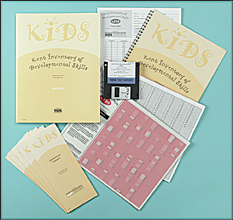Kent Inventory of Developmental Skills (KIDS) | |
 | |

Here is an ideal way to respond to current mandates for early intervention. This new rating scale can be used to assess the developmental status of any infant under 15 months of age–or children, up to age 6, who have severe developmental disabilities.
Completed by the child’s caregiver, and therefore based on numerous behavior observations across a wide range of conditions, the KIDS assesses the following domains:
Cognitive Motor
Communication Self-Help
Social
For each domain, the KIDS provides developmental age scores, which both parents and professionals find easy to understand.
The scale can be completed in about 45 minutes by a parent, teacher, nurse, baby-sitter, or child care worker–anyone who is directly responsible for a significant portion of the child’s daily care. If the caregiver has trouble reading or writing, a trained interviewer can read the KIDS items aloud and record the caregiver’s responses. Otherwise, the caregiver need not be under professional supervision when completing the scale. He or she may complete it at home and return it for scoring.
The developmental age scores produced by the KIDS give you a clear picture of the child’s overall developmental status as well as his or her relative strengths and needs. The KIDS profile tells you whether the child is “developmentally delayed,” “at risk,” or “not delayed.” In addition, standard scores allow you to compare developmental status across time, samples, and measures. And optional developmental timetables identify emergent behaviors in each domain–behaviors that the child can be expected to learn next if development is proceeding normally.
The KIDS CD allows you to administer the inventory on your computer (or enter responses from the Answer Sheet), score it instantly, and print out a complete interpretive report on the spot. The computer report provides developmental age scores and standard scores for the full scale and each of the five domains. It explains the scores, noting any skills that are in the “delayed” or “at risk” range; it prints developmental timetables for each domain; and it suggests activities tailored to the child’s specific developmental status.
Standardized on samples of healthy infants in the U.S. and Europe, the KIDS has proven valid with diverse populations, in various settings–including hospitals, neonatal ICU follow-up programs, early intervention programs, adoption agencies, parenting classes, and programs for mothers with substance abuse problems.
In addition, the KIDS offers economy, easy administration and scoring, and a natural way to bring caregivers into the assessment and treatment process, as mandated by IDEA (PL 101-476). It is an excellent first step in any early intervention program.
Component
KIT: Includes 1 Reusable Administration Booklet; 25 Answer Sheets; 25 Profile Sheets; Manual;
1 Set of 5 Scoring Templates; 5 Developmental Timetables


